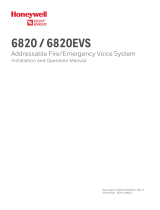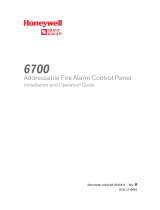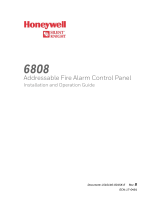Page is loading ...

Installation Manual: MC-1000 Multi-Connect Expander
NOTICE TO THE INSTALLER
This manual provides an overview and the installation instructions for the MC-1000 module.
All terminals are power limited and should be wired in accordance with the requirements of NFPA 70 (NEC) and NFPA 72 (National
Fire Alarm Code). Failure to follow the wiring diagrams in the following pages will cause the system to not operate as intended. For
further information, refer to the control panel installation instructions.
The module shall only be installed with listed control panels. Refer to the control panel installation manual for proper system
operation.
1. Description
The Multi-Connect Expander (MC-1000) allows up to sixty-three (63) re alarm control panels to share a single reporting
technology. Each MC-1000 supports communication between the host reporting panel and two client panels. The MC-1000
communicates with the host and client control panels via the potter P-Link communication bus. The MC-1000 can be mounted in
either the control panel cabinet, the intelligent power supply, AE-2, AE-8 or the AE-14 expander cabinet. Each card is mounted to
the exclusive Stacker Bracket for secure and accessible mounting.
2. Setting the Address
Each P-Link device has a ve (5) position dip switch which is used to program the device address ranging from one (1) to thirty-
one (31). The table below may be used to set dip switches when addressing any P-Link module:
Figure 1. Dip Switch Settings Table (Addresses 1–31)
Note: Each "gray" box indicates that the dip switch is "On," and each "white" box indicates "Off."
The examples shown below illustrate a P-Link's dip switch settings: the 1st example shows a P-Link module not addressed where
all dip switch settings are in the default "Off" position, the 2nd illustrates an addressed P-Link module via the dip switch settings.
Figure 2. Examples of P-Link Module Showing Default Dip Switch Setting (Unaddressed) & Addressed
Document 5406315-A 02/16
Potter Electric Signal Company, LLC • St. Louis, MO • Phone: (800) 325-3936 • www.pottersignal.com
PAGE 1 OF 3
1 2 4 8 16 1 2 4 8 16
1 17
2 18
3 19
4 20
5 21
6 22
7 23
8 24
9 25
10 26
11 27
12 28
13 29
14 30
15 31
16 1 2 4 8 16
1 2 4 8 16
Off
On
1 2 4 16
8All dip switches are
shown in the "Off"
position. Off
On
1 2 4 16
8Example shows this P-Link module
address = 10. Dip switches #2 & 8
are in the "On" position.
firealarmresources.com

INSTALLATION MANUAL: MC-1000 MULTI-CONNECT EXPANDER
Document 5406315-A 02/16
Potter Electric Signal Company, LLC • St. Louis, MO • Phone: (800) 325-3936 • www.pottersignal.com
PAGE 2 OF 3
Before connecting a device to the RS-485 connection, take the following precautions to prevent potential damage to the RS-485
connection.
• Power to the RS-485 connection is removed.
• Field wiring on module is correctly installed.
• Field wiring has no open or short circuits.
3. Technical Specications
Standby Current 10mA
Alarm Current 10mA
Operating Temperature Range 32̊ to 120̊ F (0̊ to 49̊ C)
Operating Humidity Range 10%-93% (non-condensing)
Max no. of MC-1000 Expanders 31
Dimensions (WxHxD) 4" x 6" x 1 5/8"
4. Installation
The MC-1000 is connected to the re control panels using a 4-wire RS-485 connection. The connection is power limited and
supervised. The MC-1000 can be mounted in either the control panel cabinet, the intelligent power supply repeater, AE-2, AE-8 or
the AE-14 expander cabinet. Each card is mounted to the exclusive Stacker Bracket for secure and accessible mounting.
The wiring diagrams shown below illustrate how to wire a MC-1000 as Class B and Class A.
Figure 3. Examples of Wiring a MC-1000 as Class B and Class A
- + A B
Expansion
Device
- + A B
P-LINK
- + A B
P-LINK
- + A B
Panel
Connection
Class A
Expander
Connection
Expansion
Device
To the next device
- + A B
Expansion
Device
- + A B
P-LINK
- + A B
Panel
Connection
Expansion
Device
firealarmresources.com

INSTALLATION MANUAL: MC-1000 MULTI-CONNECT EXPANDER
Document 5406315-A 02/16
Potter Electric Signal Company, LLC • St. Louis, MO • Phone: (800) 325-3936 • www.pottersignal.com
PAGE 3 OF 3
Figure 4. Example of Wiring a MC-1000 Module (Showing Host Panel & Client Panel)
Notes:
• RS-485 wiring style supports Class A and Class B.
• RS-485 is power limited.
• Wiring for terminals (A, B) and (+, -) are supervised.
• All wiring is between #12 (max.) and #22 (min.).
• Wire Preparation – Strip all wires 1/4 inch from their edges as shown here:
– Stripping too much insulation may cause a ground fault.
– Stripping too little may cause a poor connection and subsequently an open circuit.
These instructions do not purport to cover all the details or variations in the equipment described, nor provide for
every possible contingency to be met in connection with installation, operation and maintenance.
Specications subject to change without prior notication.
For Technical Assistance contact Potter Electric Signal Company at 866-956-1211.
Actual performance is based on proper application of the product by a qualied professional.
Should further information be desired or should particular problems arise, which are not covered sufciently for
the purchaser's purpose, the matter should be referred to a distributor in your region.
1/4 inch
HOST PLINK CLIENT 1 PLINK CLIENT 2 PLINK
- + A B - + A B - + A B
TO HOST PANEL P-LINK
(REPORTING PANEL)
TO CLIENT 2 PANEL P-LINK
TO CLIENT 1 PANEL P-LINK
MC-1000
MULTI-CONNECT EXPANDER
S1
firealarmresources.com
/



